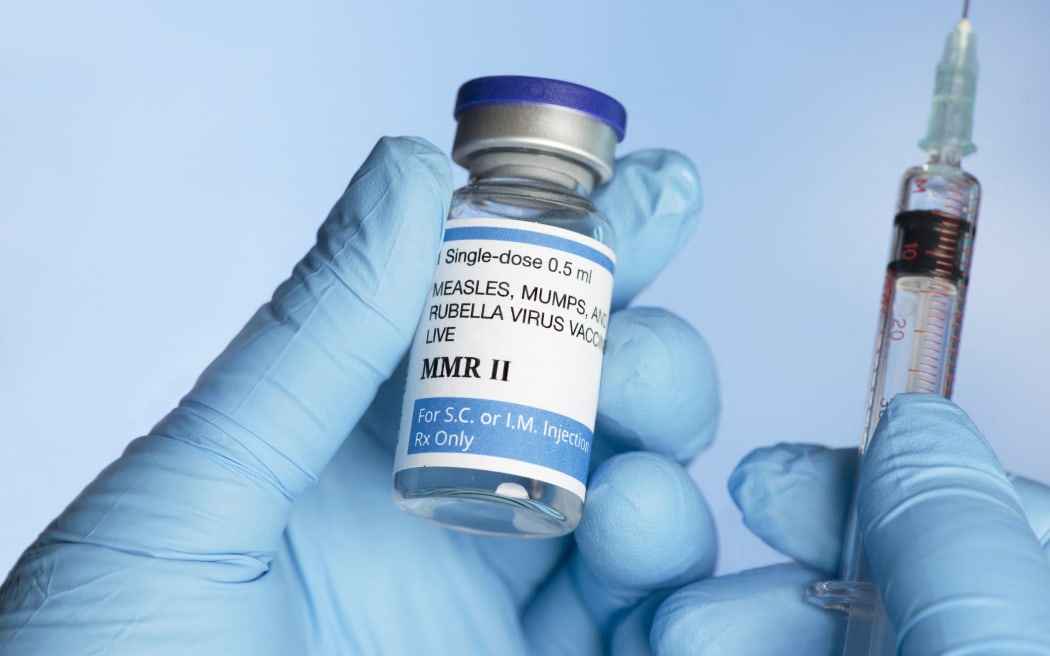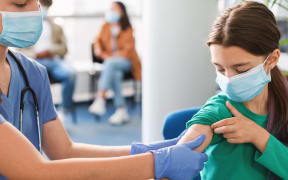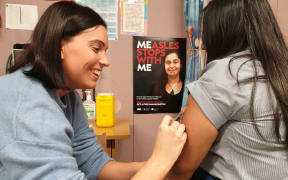
Dr Amanda Kvalsvig of the University of Otago's Department of Public Health says it is a matter of when, not if, an outbreak is going to happen. Photo: AFP / Science Photo Library
Medical experts believe an international increase in measles cases will soon reach New Zealand, with the blame falling on rising anti-vax rhetoric and disruptions caused by the pandemic.
Auckland University lecturer and immunologist Dr Anna Brooks said outbreaks had been reported in a number of countries already.
While Aotearoa was yet to see a resurgence of the illness, she said it was only a matter of time.
"Vaccine hesitancy really has been part of what we've seen unfolding globally. And you know, to combat that with education - people like to be educated about these things and understand the seriousness of an illness."
The US in December experienced its biggest measles outbreak since before Covid-19 hit, centred on Columbus, Ohio. Of the dozens of children infected, fewer than 5 percent had reportedly received a single shot of the two-course measles, mumps and rubella (MMR) vaccine. The rest were unvaccinated.
A full course of the MMR vaccine offers greater than 97 percent effectiveness against measles, a disease which can suppress the immune system for years afterwards against new infections. There is also growing evidence measles can reduce immunity to diseases one has already had or been vaccinated against.
Outbreaks can be stopped via herd immunity - which for the highly infectious measles virus, requires 95 percent or more of the population to be vaccinated.
But New Zealand's vaccination rates are plummeting. Ministry of Health data shows as of September 2022, only 81.4 percent of those turning five were up to date with their vaccinations (including inoculations against a range of disease, not just measles, mumps and rubella).
"Measles is so infectious that once the vaccine levels drop in the population, we know there's going to be an outbreak," said Dr Amanda Kvalsvig of the University of Otago's Department of Public Health.
"It's a matter of when, not if, an outbreak is going to happen."
Vaccination rates correlate with poverty. Ministry data shows at age five, vaccination rates in the upper quintile regions are over 87 percent, dropping to 85.3 in the second, 81.2 in the third, 78.9 in the fourth and 75.8 percent in the most-deprived regions.
At six months of age, the division is even greater - 77.7 percent coverage in the least-deprived areas, and 60.4 percent in the worst. Fewer than half of Māori babies at that age are up-to-date with their shots.
"That came about because of some misinformation that was being communicated about the measles vaccine," Kvalsvig said.
"The measles vaccine has been a specific concern that parents have, perhaps over and above concerns they might have about vaccines in general."
The MMR vaccine was at the centre of fraudulent claims by British researcher Andrew Wakefield in an influential 1998 paper, falsely linking it to autism. The paper was later withdrawn and he was struck off the medical register.
'Huge concern'
Kvalsvig also said many parents were struggling to find the time and means to take children to healthcare appointments.
"It's never been of greater concern for our country now that our borders are open and childhood vaccination rates fell away globally due to the disruptions from the pandemic," said Brooks. "So yes, there is huge concern."
In Ohio, children are required to be inoculated against measles in order to attend a public school - but many schools reportedly ignore the mandate.
But in light of the disruptions to education caused by the Covid-19 response, Kvalsvig said a mandate would not be the right approach for Aotearoa.
"What we need is an action plan for schools that can manage those outbreaks, but always keeping the wellbeing of children at the centre of those decisions - so it's about protecting their health and their education access."
New Zealand was officially declared measles- and rubella-free in 2017, meaning new cases would only occur if brought in from overseas. Childhood vaccination rates hit a peak of over 85 percent in 2016/17, but have since fallen.
The 2019 outbreak saw more than 2000 infections in Aotearoa, and was linked to the following outbreak in Samoa, which left more than 80 dead - almost all of them children.
The Pacific nation had remarkably low vaccination rates among children, following the deaths of two children in 2018 who were given botched vaccine concoctions. The World Health Organization has expressed concern about ongoing low vaccination rates in the Pacific and falling coverage.




